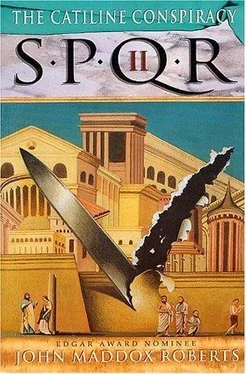John Roberts - The Catiline Conspiracy
Здесь есть возможность читать онлайн «John Roberts - The Catiline Conspiracy» весь текст электронной книги совершенно бесплатно (целиком полную версию без сокращений). В некоторых случаях можно слушать аудио, скачать через торрент в формате fb2 и присутствует краткое содержание. Жанр: Исторический детектив, на английском языке. Описание произведения, (предисловие) а так же отзывы посетителей доступны на портале библиотеки ЛибКат.
- Название:The Catiline Conspiracy
- Автор:
- Жанр:
- Год:неизвестен
- ISBN:нет данных
- Рейтинг книги:3 / 5. Голосов: 1
-
Избранное:Добавить в избранное
- Отзывы:
-
Ваша оценка:
- 60
- 1
- 2
- 3
- 4
- 5
The Catiline Conspiracy: краткое содержание, описание и аннотация
Предлагаем к чтению аннотацию, описание, краткое содержание или предисловие (зависит от того, что написал сам автор книги «The Catiline Conspiracy»). Если вы не нашли необходимую информацию о книге — напишите в комментариях, мы постараемся отыскать её.
The Catiline Conspiracy — читать онлайн бесплатно полную книгу (весь текст) целиком
Ниже представлен текст книги, разбитый по страницам. Система сохранения места последней прочитанной страницы, позволяет с удобством читать онлайн бесплатно книгу «The Catiline Conspiracy», без необходимости каждый раз заново искать на чём Вы остановились. Поставьте закладку, и сможете в любой момент перейти на страницу, на которой закончили чтение.
Интервал:
Закладка:
"This is naughty for a lady so recently married in so respectable a ceremony," I chided.
She rested her chin on crossed forearms and kicked her pretty feet in the water. "Don't be silly. I was married off because our family and the Crassi wanted to mend fences after being at odds for so long and with Pompey coming back soon. I am just a knucklebone on the great game board of politics."
"Knucklebones are hard and knobby, which scarcely describes you, cousin. Where is your fortunate husband, by the way?"
"Snoring on the couch, when I left him. I have no intention of missing any part of an occasion like this, so I came here to refresh myself. Why don't you join me?"
I stood. "Some other time, Felicia. Dignity of office, and so forth."
" Quaestor?" she snorted. "That's not an office, it's a sentence!"
I winced at her cruel but accurate assessment of my place in the scheme of things, and took my leave. In the exercise yard, a troupe of gladiators were going through a series of mock duels, using blunted weapons but wearing their most splendid armor. I passed their clash and clatter and found the steam room. There I gave my clothes and wreaths to an attendant, took a pile of towels and went into the muggy heat. In the dimness, I found a bench and sat. In moments, I was sweating like a legionary at the end of a long day.
Anyone seriously dedicated to the joys of feasting knows that it is essential to take an occasional break and purge oneself of the more heroic excesses. I fully intended to see the sun come up on this one. Even here, though, Lucullus had seen to our comfort. In the center of the steam room was a huge basin in which pitchers of wine sat packed in snow hauled down from the Alps in wagons.
An extraordinarily handsome young man came in, followed by a group of youths of similar age. He was about nineteen, with black, curly hair and a smile that would have shamed Apollo. He squinted through the steam, then walked up to me and held out his hand.
"The Quaestor Metellus?" he asked.
"The same. And you are…?"
"Marcus Antonius." I had thought the family look was familiar.
"The Consul's son?" I asked. A companion handed him a cup of the chilled wine.
"His nephew. My father is the elder Marcus." He sat next to me, while his friends, whom he clearly dominated, found places for themselves. "Your father presided as augur at my manhood ceremony a few years ago."
"Then this must be your first triumphal banquet," I said. "There hasn't been one since Afranius and Calpurnianus celebrated theirs seven years ago."
"I've heard those were nothing like this one." His eyes gleamed with youthful enthusiasm. "Lucullus knows how to throw a banquet."
I agreed that this was so. His father, the elder Marcus Antonius, had been an incompetent and a criminal even by Antonine standards. Sent out to destroy the Mediterranean pirates, he had instead gone plundering in the provinces. He attacked Crete on the pretext that they were allied with the pirates. On that island he had accomplished the truly extraordinary feat of being utterly defeated by the Cretans. He was nicknamed Creticus in derision and had died in Greece, unmourned, about ten years before this memorable banquet. One had to pity this splendid young man his paternity.
"Do you know what I love about the baths?" he said. "They're the only places in Rome where you can go and be sure of never running into any Gauls." His friends laughed loudly at this, although he laughed even louder. He had a fine, infectious laugh that made his weakest witticisms seem brilliant.
"Do you mean those Allobroges over there at the banquet?" I asked.
"Who else? They've been calling on my uncle nearly every morning. That means I have to endure them when I make my morning calls." Men that young think that all of life's vexations are aimed solely at them.
"It could have been Germans," I said consolingly. Then one of the youths challenged him to a wrestling match and they all ran out to the exercise yard. A plunge into the cold pool almost completely cleared my head. After being vigorously toweled and pummeled by the attendants, I felt ready to face the next few courses of the banquet.
On the street outside the bath, a great crowd of citizens had gathered. Facing the garden, they chanted praises and congratulations to the triumphator. Some of the chants were so ancient that nobody knew what the words meant. I was about to push my way into the crowd when I saw a single, lonely figure standing on the pedestal of a statue of Flora that stood in an alcove between the public bath and the new Temple of Minerva. The man was strangely erect and dignified, and even in the gloom of the alcove he seemed familiar. Curious, walked over to the pedestal and looked up.
"Consul?" I said.
Cicero looked down. "Is that Decius Metellus? Come up and join me."
Mystified, I went behind the statue where there were steps to mount the pedestal. It was almost four months past the Floralia, but the statue of the goddess had been freshly draped with flowers in honor of the occasion. The smell was almost overpowering.
Gripping a fold of the goddess's gown to steady myself, I rounded the statue and found Cicero gazing upward. He was very still, and did not seem at all like his usual, public self.
"Here, out of the torchlight," he said, "it is a good night for observing the stars. I spend a part of every night in contemplating the stars."
"My father taught me to take the auguries," I said, "but except for the falling sort, those don't take great account of the stars. I'm afraid he considers stargazing to be Oriental mummery."
"Many Romans think that, but they are wrong. I have studied writings from Egypt and Persia, the Greeks, even the wild Druids agree that the stars exert great influence on us. Especially that one." He pointed and it was plain which one he meant. It was by far the brightest and the reddest, hanging like a brilliant drop of blood amid the jewellike points of white.
"Even I know that one," I said. "Sirius, the Dog Star, Canicula, the little dog, and a few other names. Patron of these very days, the dog days of late summer."
"What you say is what everyone knows. But why do we fear that one? What makes it a star of evil reputation?"
"I thought it was because the dog days are the time of pestilence and the beginning of the season of storms." This seemed an odd subject to be discussing at such a festive time.
"That is true, but there is more. At the festival of this gentle goddess"-he patted the knee of the statue-"at the Floralia, we sacrifice red dogs to appease that star.
We do the same at the Robigalia when we honor her male counterpart. Why do we do that?"
I shrugged, longing for some more of that Caecuban wine. "These are very ancient deities," I said. "We perform a good many rituals we no longer understand."
"That is true. It is also true that never in living memory has Sirius been as red as it has been this summer."
In the distance, faint over the chanting of the crowd, we heard the heralds proclaim the resumption of the feast. With great relief I descended and helped Cicero down. He did not need help because he was feeble. He was only forty-three at the time, astoundingly young for a Consul. He needed aid because of the awkwardness of his formal toga, which was so white that he almost glowed in the darkness of the alcove.
As we made our way through the crowd, I thought about what he had said. Even more than most people, Romans live by signs and portents. I know of no other people who maintain two separate priesthoods to interpret omens. We take no public and few private actions without consulting the auguries and the haruspices. When all else fails, we will consult the Sibylline Books, for which we maintain a college of fifteen men who are empowered to look into them in times of national danger. Besides these more serious matters, the people of Rome, from Consuls to slaves, are mad for omens, which they will find in every imaginable place and circumstance.
Читать дальшеИнтервал:
Закладка:
Похожие книги на «The Catiline Conspiracy»
Представляем Вашему вниманию похожие книги на «The Catiline Conspiracy» списком для выбора. Мы отобрали схожую по названию и смыслу литературу в надежде предоставить читателям больше вариантов отыскать новые, интересные, ещё непрочитанные произведения.
Обсуждение, отзывы о книге «The Catiline Conspiracy» и просто собственные мнения читателей. Оставьте ваши комментарии, напишите, что Вы думаете о произведении, его смысле или главных героях. Укажите что конкретно понравилось, а что нет, и почему Вы так считаете.










